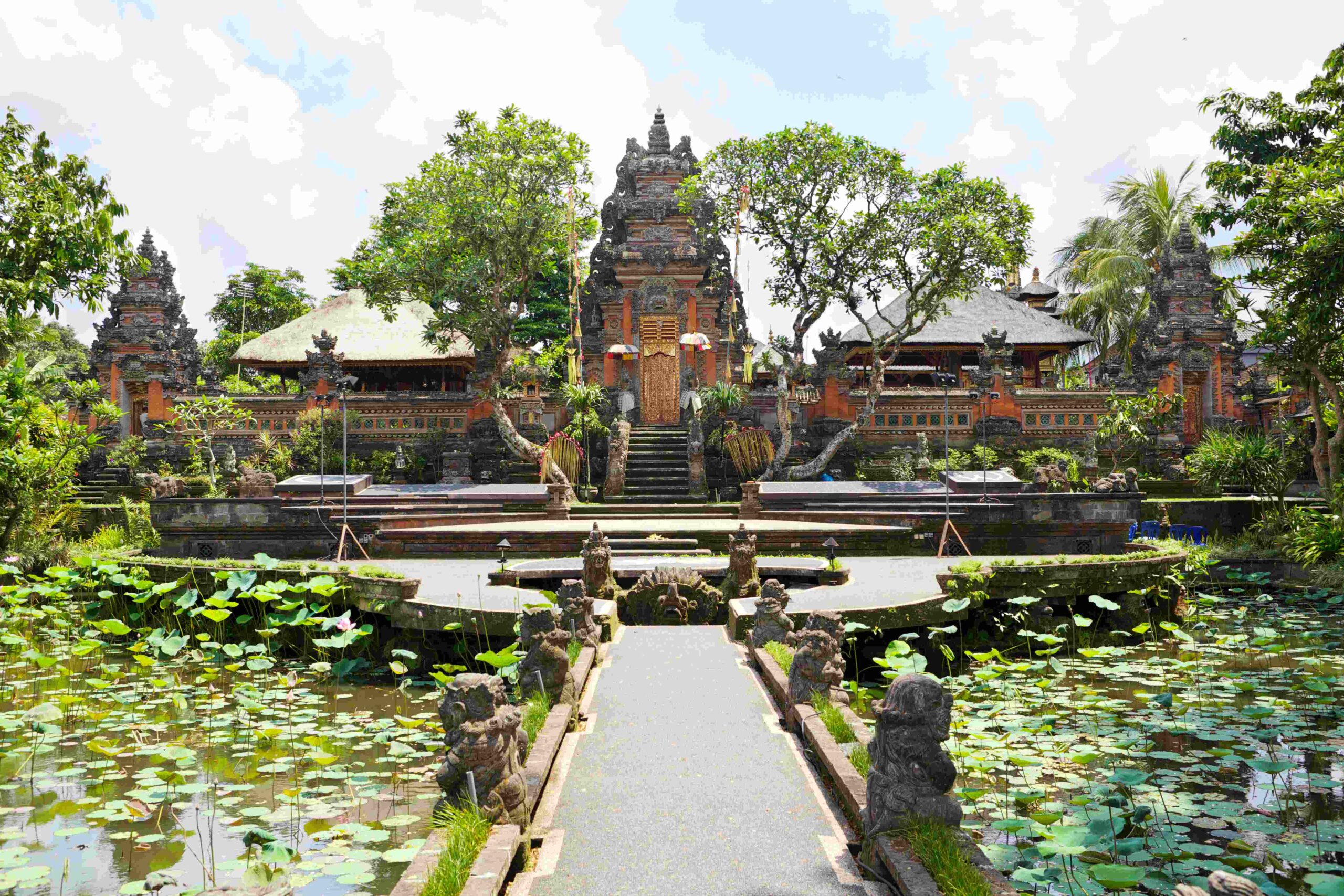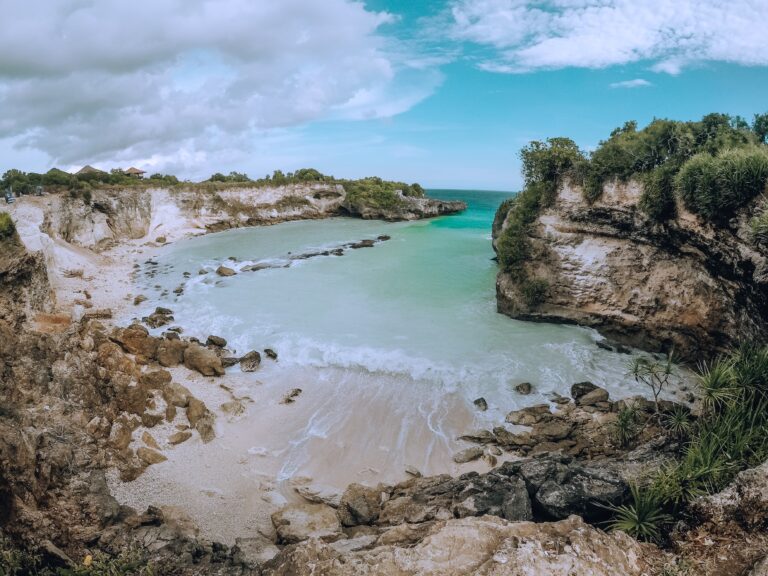Ubud is in Central Bali and it’s famous for its mountain valleys, rice terraces, and Hindu temples. It’s often considered to be the spiritual and cultural heart of the island.
We’ve got a guide to the best Ubud temples including what to expect and where to find them all.
You don’t have to visit every temple when you visit Bali (it would take a lifetime) but we do recommend that everyone spends at least some time in Central Ubud and uses it as a hub to visit some of the amazing temple sites in the area and this is why.
Where Is Ubud?
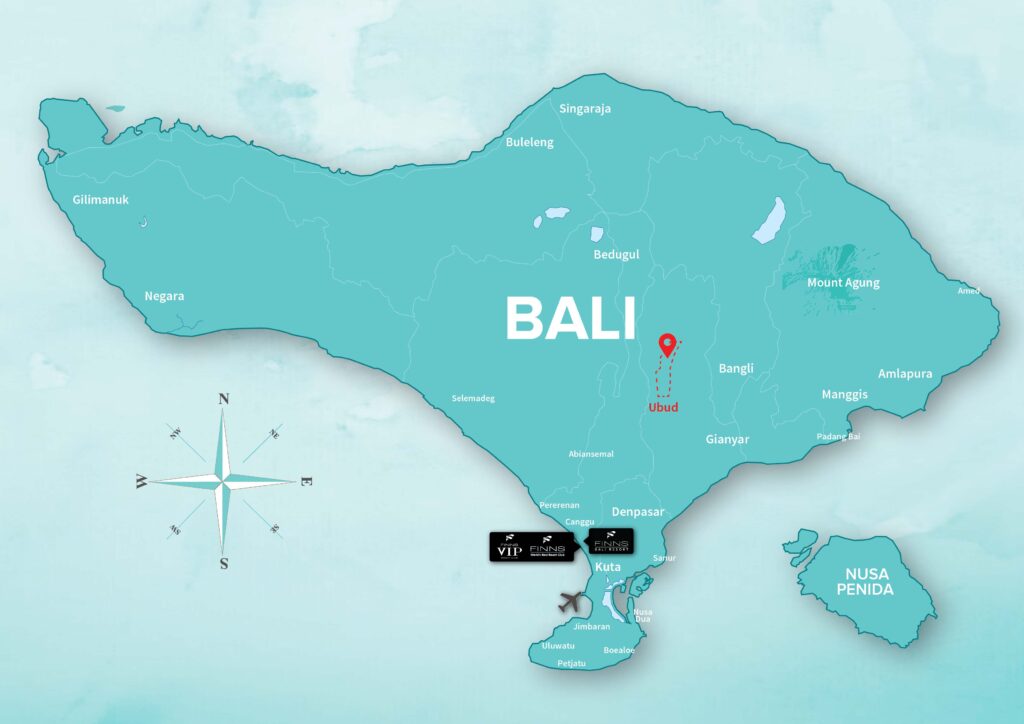
Ubud is in Central Bali in the central foothills of Gianyar Regency. It’s a relatively short drive from most of the other big tourist destinations though thanks to the road conditions and traffic, it takes a bit longer to get there than you might expect from the distances alone.
How To Get To Ubud?
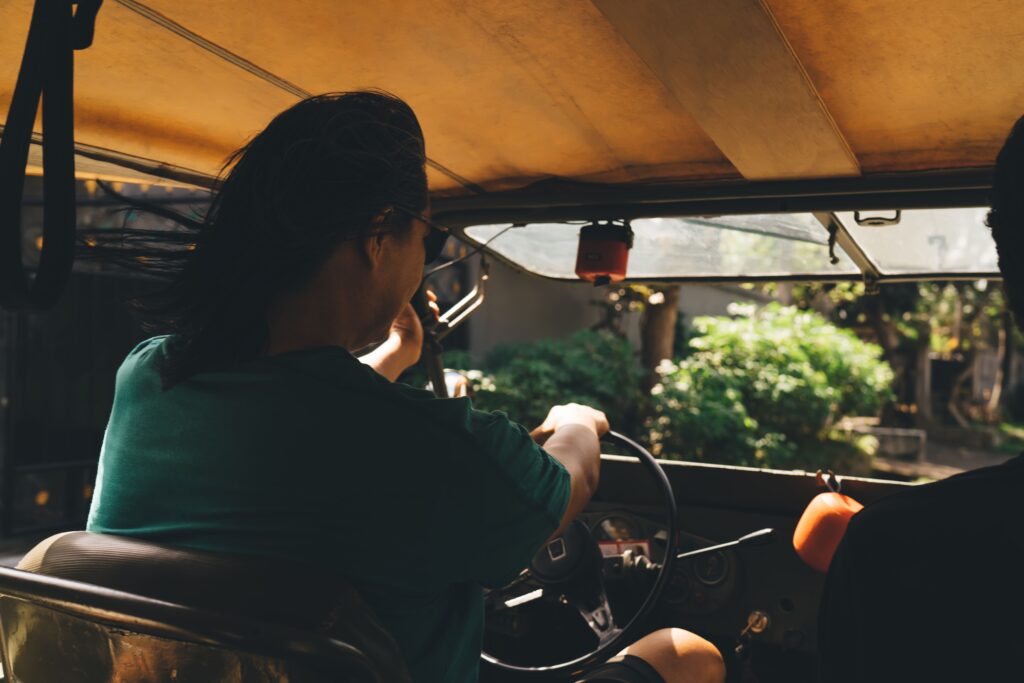
You have a few options when it comes to getting to Ubud:
Airport transfer service – if you’re coming straight to Ubud from Ngurah Rai International Airport, it’s often convenient to book a transfer with your hotel. That way they will meet you at the airport and whisk you off straight to the hotel.
Grab/Gojek – wherever you’re travelling from, you can always use a ride-hailing app. This is very cost-effective but it does limit you to going from A to B with no stops on the way.
Private Car – this is the most convenient way to get around in Bali and you can rent a car with a driver for a very small fee (plus petrol costs). It costs more than Grab but it means you have complete freedom of where to stop and when.
Join a Tour – if you want to travel around Ubud and see the temples, one of the easiest ways to do so is to join a tour of the area.
Scooter – we don’t recommend this. It’s cheap but the roads in Bali aren’t great, traffic is hazardous and staying road-legal is difficult (and if you’re not legal, your insurance is not valid). It’s better to pay a little more to visit Central Ubud and to avoid a visit to the hospital.
How To See The Best Temples In Ubud?
While you can use an airport transfer service or a Grab to get to Ubud, it’s not the ideal way to get out and see the temples.
Your options are going to boil down to:
A private car and driver – this is the most convenient way to do things and a safe option. It’s going to cost a bit more and won’t come with a guide though.
A guided tour – if you want to learn about the places you visit, it’s always best to join a tour party. That way you will be provided with useful and interesting info regarding each stop on your itinerary. Local guides will also ensure that you’re not bothered by touts offering guide services at each stop.
Scooter – in addition to the reasons above for not using a scooter, you also can’t guarantee safe parking at all the sites around Ubud. It’s not a big risk but it could be expensive if your scooter goes missing or is damaged. We’d stick to tours and cars ourselves.
When Is The Best Time To Visit The Temples In Ubud?
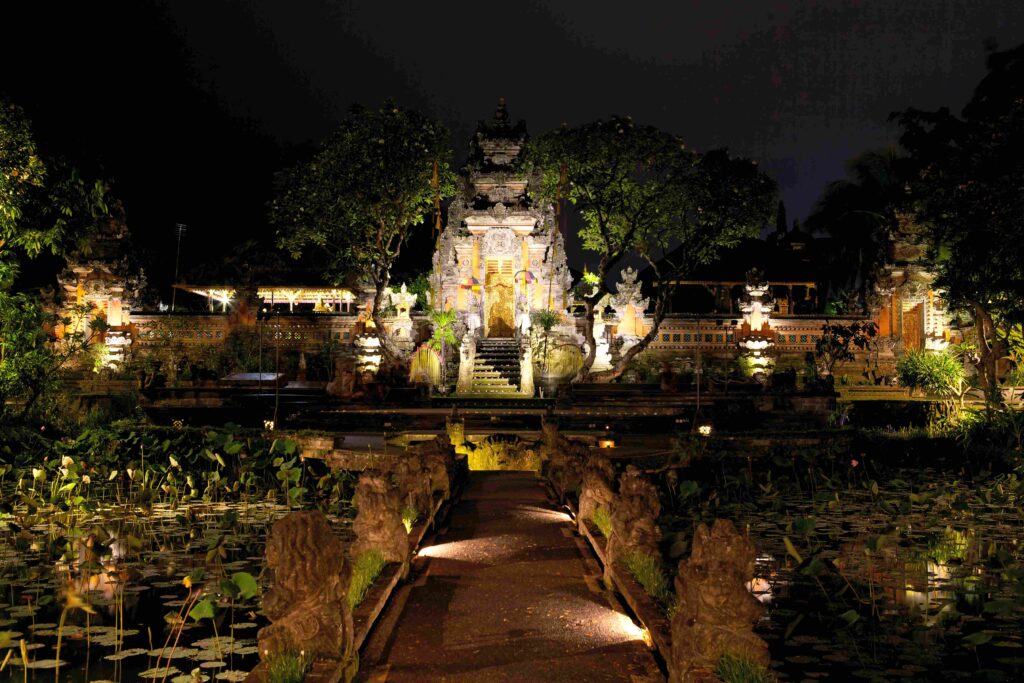
There is no perfect time to visit each of the best temples on our list.
While the weather is a bit nicer in the dry season, there are more crowds, the cost of accomodation and flights goes up and much of the jungle and rice paddies turn brown and shabby and, of course, the waterfalls are far less dramatic when there’s less water.
Conversely, in the rainy season, you still get plenty of sunshine, but it’s hotter and more humid, things are cheaper and the waterfalls and rainforest are more impressive.
However, there is one thing about the time to visit the best temples in Bali – if you can, go in the early mornings. The more popular sites get very crowded in the late morning through to the early evening.
We think spiritual places are often best explored in peace and tranquillity rather than with a group of loud tourists around you.
The 18 Best Temples In Ubud
If you were to explore Bali thoroughly, you would find that there are over 20,000 temples on this island and that to visit most temples would take a lifetime.
Even in Ubud Central, there are more temples than most people are aware of. So, we’ve tried to keep our list of the best temples here in Ubud short and concise.
Each sacred site on this list has been chosen because it is culturally significant and interesting to look at.
That’s not to say that the other temples in the area or across the country aren’t interesting, they are, it’s just a recognition that most people spend two weeks in Bali on a holiday and simply can’t see them all.
Pura Taman Saraswati Temple: Water Temple Complex
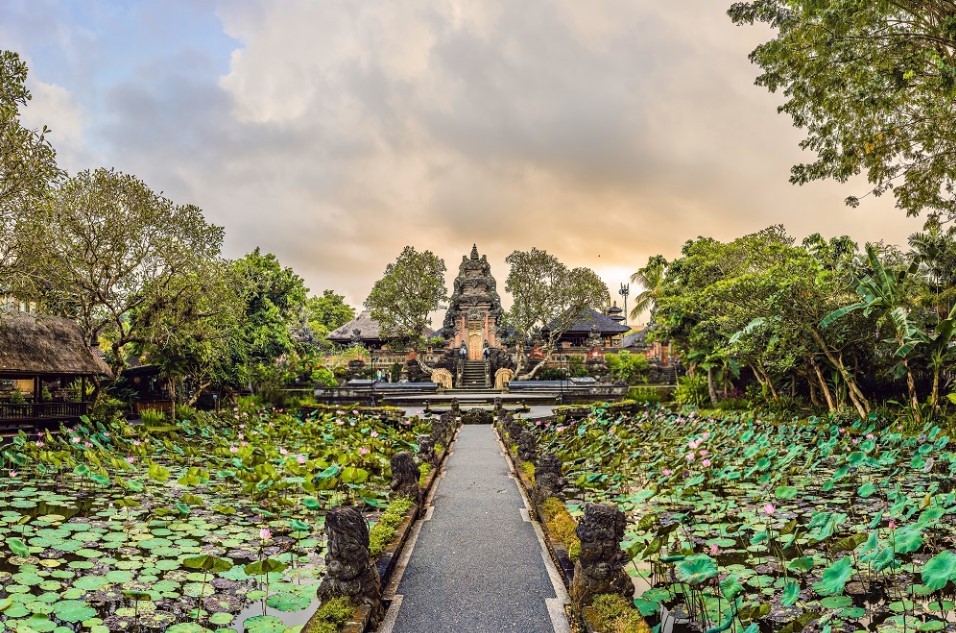
This temple is just 5 minutes from the centre of Ubud, and was built back in the 1950s and it was dedicated to the Hindu Goddess Saraswati.
It’s a photographer’s dream destination and the doors are amazingly detailed on each part of this complex. The West Door, in particular, is incredibly ornate.
There’s no entrance fee to the temple but if you want to watch the traditional Balinese dance performance here that’s 80,000 IDR.
You only need about 15 minutes to walk around the grounds though you may want to spend longer if you want to get great photos.
We’ve got an excellent guide to Saraswati Temple, which tells you everything you need to know about it.
Where Is It? F7V6+CGP, Jl. Kajeng, Ubud, Kecamatan Ubud, Kabupaten Gianyar, Bali 80571, Indonesia
Pura Dalem Temple: Bizarre Statues
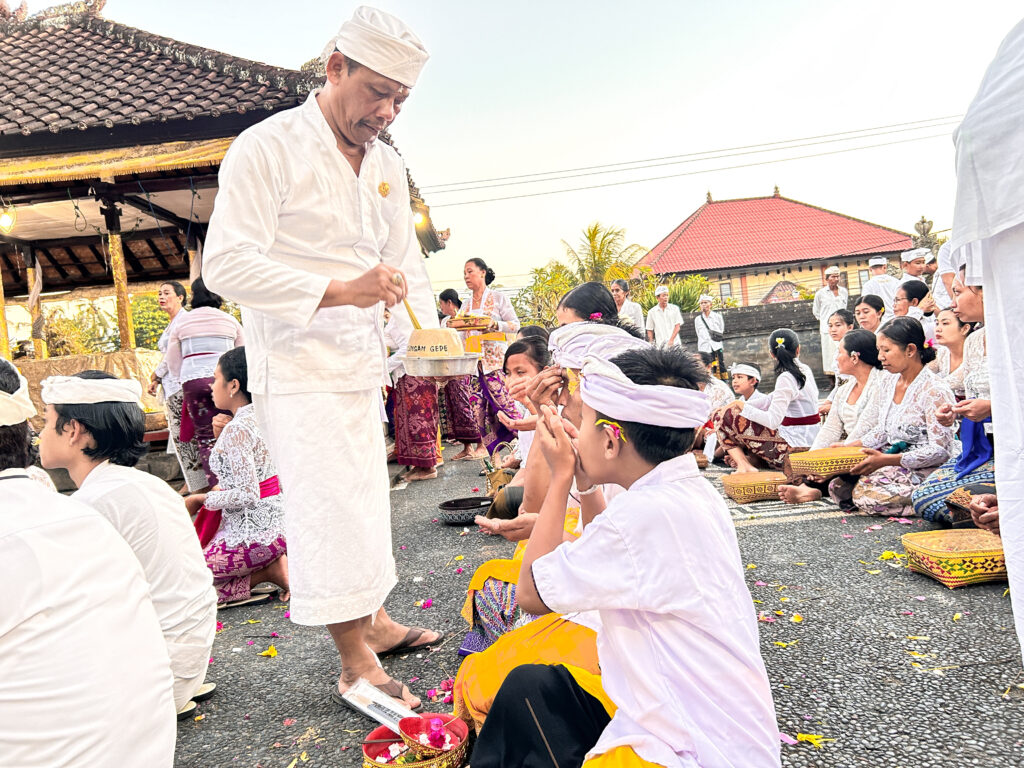
This slightly disturbing temple is just outside of the city and it’s dedicated to the spirit of death!
That means it’s been decorated with some of the most bizarre and eye-catching statues you’ll see in Bali. Bare-breasted demon ladies are the order of the day.
Look out for the image of Rangda, the queen of the demons, eating babies, it’s not as frightening as it sounds, honest.
The split temple gates are very cool and look great in photographs too.
Where Is It? Jl. Raya Ubud, Ubud, Kecamatan Ubud, Kabupaten Gianyar, Bali 80571, Indonesia
Ubud Sacred Monkey Forest: A Sacred Site With A Lot Of Monkeys
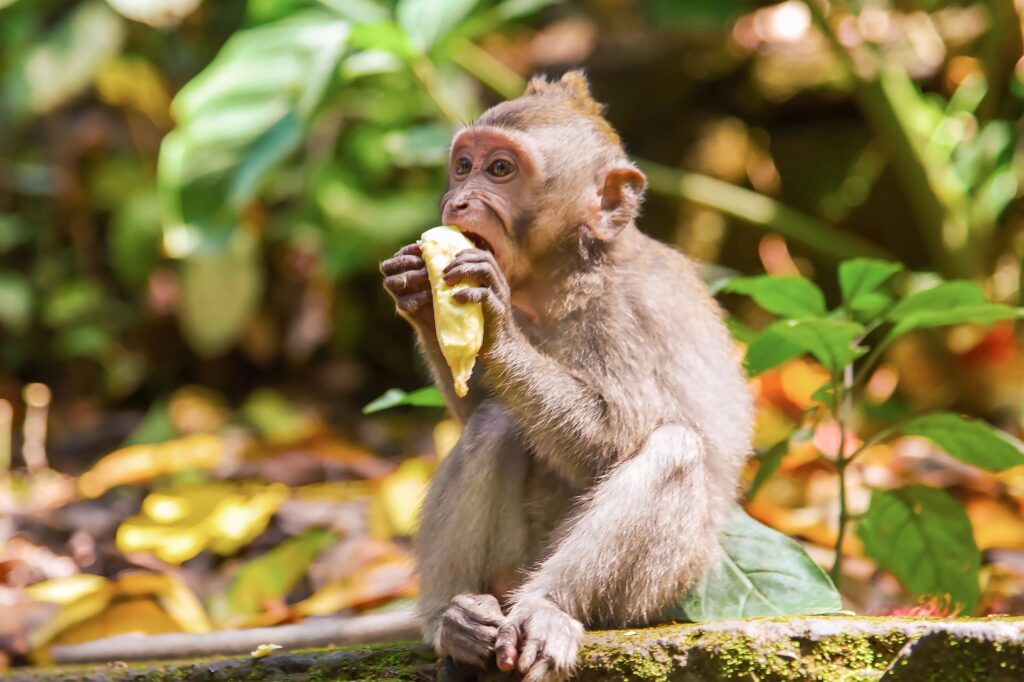
If you want to feel like Indiana Jones then the Monkey Forest is definitely going to be for you.
The Ubud Sacred Monkey Forest is, indeed, full of wild monkeys and they are often seen in photographs of the area.
We would warn you that they are little thieves who often steal cameras, phones and snacks from tourists and it’s a good idea to keep your possessions out of reach of the monkeys here.
It also has several temples on its grounds, the main one is Pura Dalem Agung Padangtegal which was built in the 14th century, which makes it quite new for an ancient temple.
You can easily spend half a day at the monkey forest if you want to properly explore it. However, it’s super popular and can get very busy at peak times.
Where Is It? Jl. Monkey Forest, Ubud, Kecamatan Ubud, Kabupaten Gianyar, Bali 80571, Indonesia
Puri Saren Agung: Ubud Palace
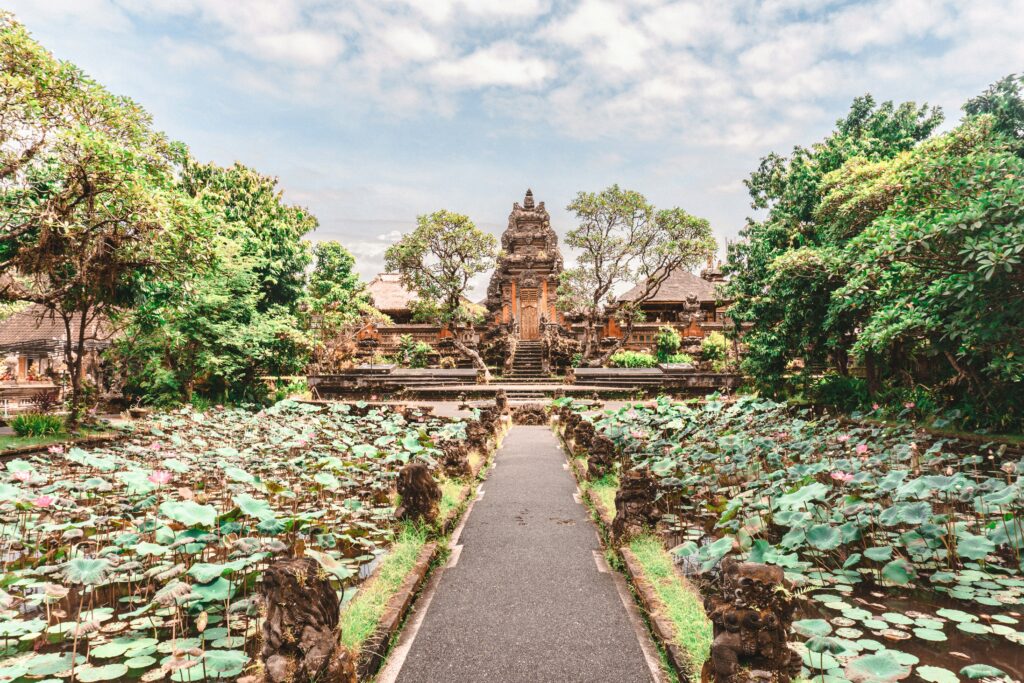
Ubud Palace is right in the centre of the town and it’s right next to Ubud Market which makes it very easy to find.
It was built back in the 1800s for the royal family of Ubud (Bali was not a single kingdom prior to joining Indonesia, it was 9 kingdoms).
It’s not the biggest place on our list and it may only take 15-30 minutes to wander around.
The art and stonework are what make the Ubud Palace a compelling place to visit and the monkey carvings are amazing!
We should note that the temple here is off-limits to tourists, so you can only view the outside but the rest of the grounds make up for this.
Where Is It? Jl. Raya Ubud No.8, Ubud, Kecamatan Ubud, Kabupaten Gianyar, Bali 80571, Indonesia
Gunung Lebah Temple: A Jungle Temple
This is one of the more “off-the-beaten-path” temples in this part of Bali and yet, it’s very easy to find as it’s near the popular Murni’s Warung (a local restaurant that everyone in Ubud knows).
It is said to have been built by Rsi Markendeya who is also thought to have founded the Mother Temple at Besakih.
It’s not a big favourite with the tourist crowds and it’s one of the best places in Ubud if you want to just stop and meditate.
The view over the Cerik River here is very pleasant too.
Where Is It? Jalan Raya Ubud No.23, Sayan, Ubud, Gianyar, Bali 80571, Indonesia
Goa Gajah Temple: The Elephant Cave
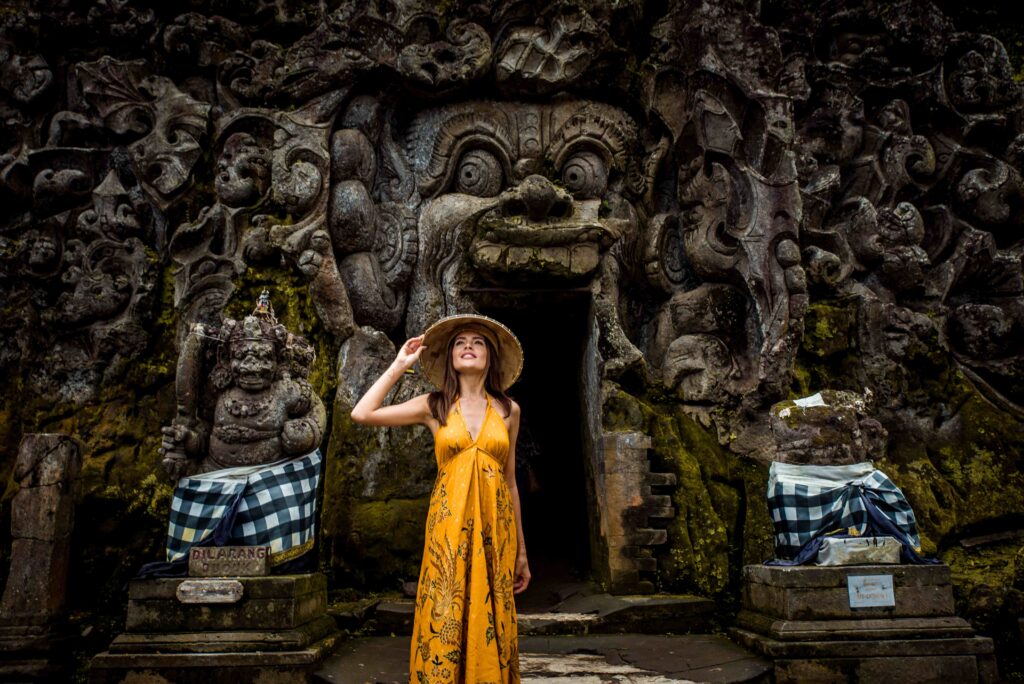
The Goa Gajah Temple is one of the most famous sites on the island and that’s because the entryway is a carved mouth of a fearsome monster!
Fortunately, as it’s made out of rock, it won’t bite but it will make for a very memorable Instagram photo.
It was nominated for consideration as a UNESCO World Heritage site in 1995 but as with many other such sites in Bali, it was withdrawn at the request of the Balinese government.
It’s got hints of the Angkorean temple systems about it and it’s a very popular place in Ubud. Get there early to beat the crowds. Of course, there are plenty of other caves in Bali that you can visit if it’s too busy at this one
Where Is It? Bedulu, Blahbatuh, Gianyar Regency, Bali, Indonesia
Samuan Tiga Temple: A Hidden Gem
We just can’t work out why this place isn’t a massive draw with tourists, it’s just 800 yards outside of the town but there is rarely anybody else there when we visit except local worshippers.
Samuan Tiga is a large site that dates back to the 10th century AD and it’s one of the most striking temples that we’ve seen in Bali. The intricate stonework is quite incredible.
It’s meant for the worship of the Hindu Trinity and it’s thought that all three of the deities once met at this site before the temple was built!
However, this was originally a Buddhist site which later became Hindu as the Hindu faith swept through Bali.
(Interestingly, you can find a lot of Buddhist/Hindu temples around Southeast Asia including, of course, the world-famous Angkor Wat in Cambodia. However, it’s only in Bali that the sites remain Hindu rather than having reverted to Buddhist use).
Where Is It? Jl. Pura Samuan Tiga, Bedulu, Kec. Blahbatuh, Kabupaten Gianyar, Bali 50581, Indonesia
Goa Garba Ruins: Pejeng Village
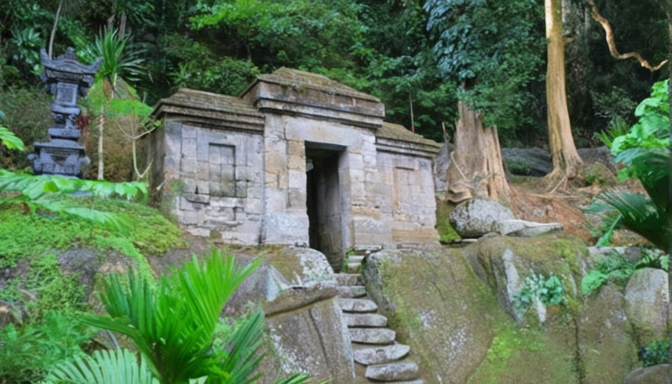
This ancient cave temple is a fascinating place that would once have been used to educate the royal family about their religious obligations.
It was built back in the 12th century, but there’s very little known about its history apart from a minor set of inscriptions on the wall (which tell us that King Jayapangus was responsible for its construction).
The famous Balinese military commander Kebo Iwa was said to have undertaken his religious education at this temple in the 14th century.
This is one of the most peaceful spots on our temple tour and that’s because most people don’t even seem to know it’s there.
Take a walk down by the Pakerisan River while you’re here, it’s quite lovely.
Where Is It? Goa Garba Ruins, Pejeng Kelod, Tampaksiring, Gianyar Regency, Bali 80552, Indonesia
Pura Gunung Kawi Temple: The Valley Of The Kings
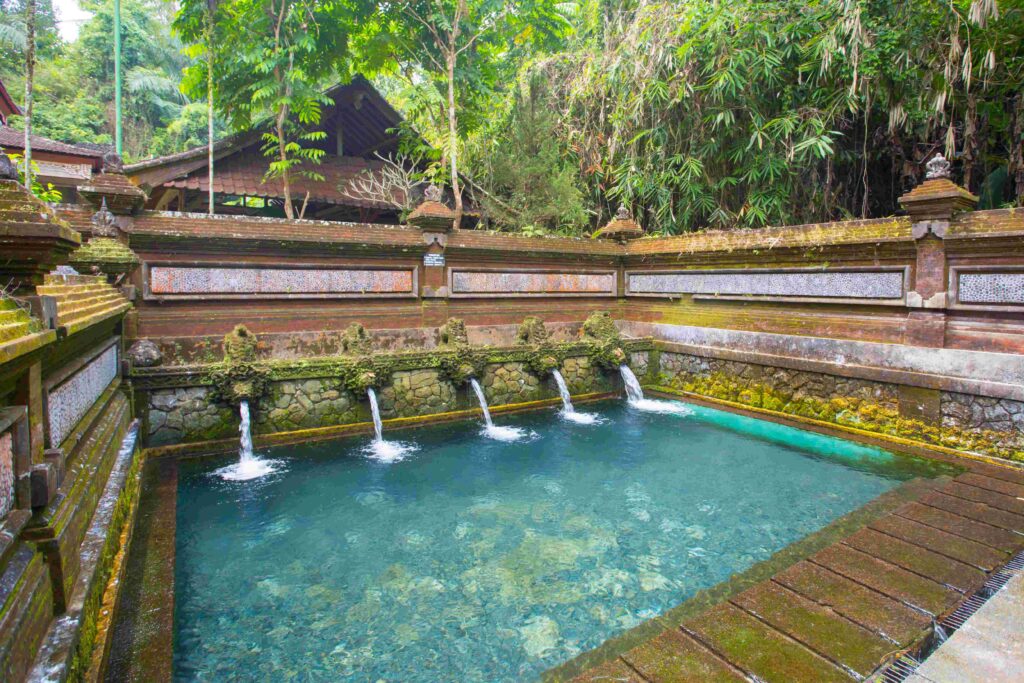
Not to be confused with nearby Gunung Kawi Sebatu Temple, this is an ancient ruin with 10 sacred shrines that are thought to be monuments to an ancient royal family.
However, the history of Gunung Kawi is quite vague and it’s not entirely clear as to which kings and which family members were interred here.
The carvings in the rock face for each shrine are absolutely unique on the island and there’s no doubt that this feels like “real Bali”.
The complex was built back in the 11th century and it stands in two halves straddling the sacred Pakerisian River. These are connected by a bridge which makes life very easy for visitors.
We’ve got a great guide to Gunung Kawi temple here.
Where Is It? H8G6+QWG, br penaka, Tampaksiring, Kec. Tampaksiring, Kabupaten Gianyar, Bali 80552, Indonesia
Gunung Kawi Sebatu Temple: A Completely Different Place
Don’t miss this charming complex just outside of Sebatu, it might not be as famous as Gunung Kawi but it’s picture postcard gorgeous.
The water garden here is truly stunning and you can stop to soak up the peaceful atmosphere as you admire the koi carp swimming freely.
If you pass through the candi bentar (temple gates) you will find some lovely statues and temples in the courtyard.
You will also get to meet some of the local wildlife including rare breeds of chicken, tam-fowl and sometimes, even deer!
Where Is It? Sebatu, Tegallalang, Gianyar Regency, Bali 80511, Indonesia
Tirta Empul Temple: Water Purification Rituals
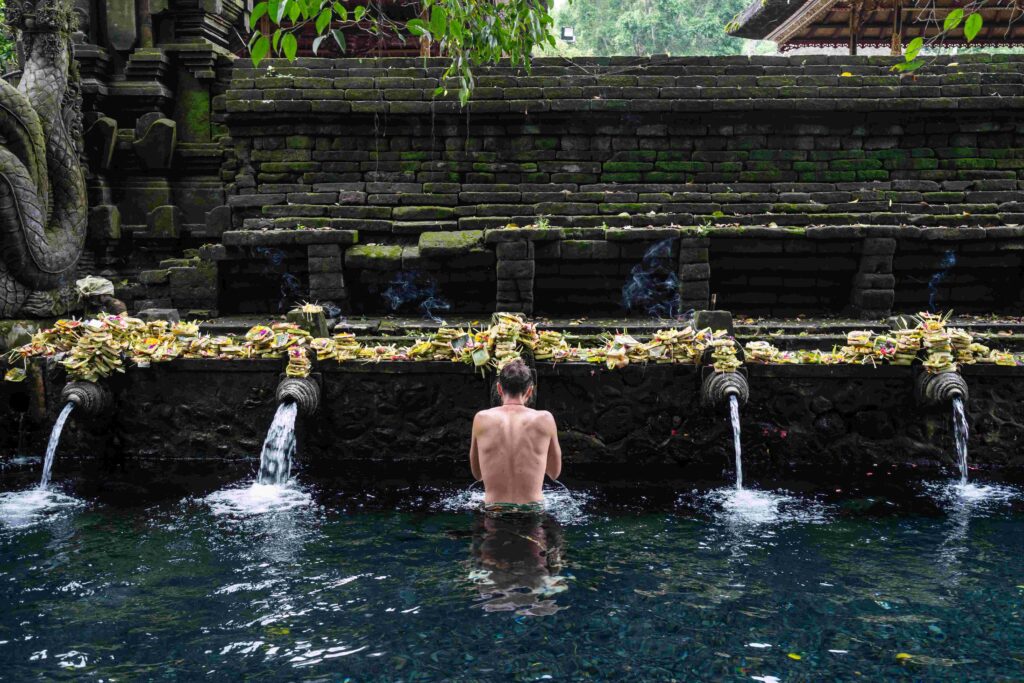
Pura Tirta Empul is one of the best-known places in the nation for water purification rituals and people come from all over the island to bathe and pray here.
Tourists are very welcome within the grounds and there’s very little of Tirta Empul that has been closed off (unlike at many other temples).
You can also bathe at Tirta Empul, it’s not reserved strictly for locals, but please bring a towel and dress modestly, this is not a place for your skimpiest bikini.
You will be provided with a sarong when you enter Tirta Empul and that’s fine for cover while bathing.
Tirta Empul is a great spot for photography and there are some amazing carvings as well as a cool Koi Pond.
Where Is It? Tampaksiring, Gianyar Regency, Bali 80552, Indonesia
Beji Griya Waterfall: Mysterious Carvings And A Temple
This is a brand new complex, quite literally, it was opened to the public in 2022 and was a scene of much excitement at the time.
The downside of its youth is that it’s expensive to get in and you can expect to pay up to 200,000 IDR per person if you want to take part in the ceremonies here.
The upside is that the carvings here are amazing, that the waterfall is much less busy than most waterfalls in Bali and the photos you get will blow your mind.
Yes, it’s definitely worth visiting this recent addition to Ubud’s temples.
Where Is It? Jl. Mawar, Punggul, Kec. Abiansemal, Kabupaten Badung, Bali 80352, Indonesia
Sangeh Monkey Forest: Another Temple With Plenty Of Monkeys
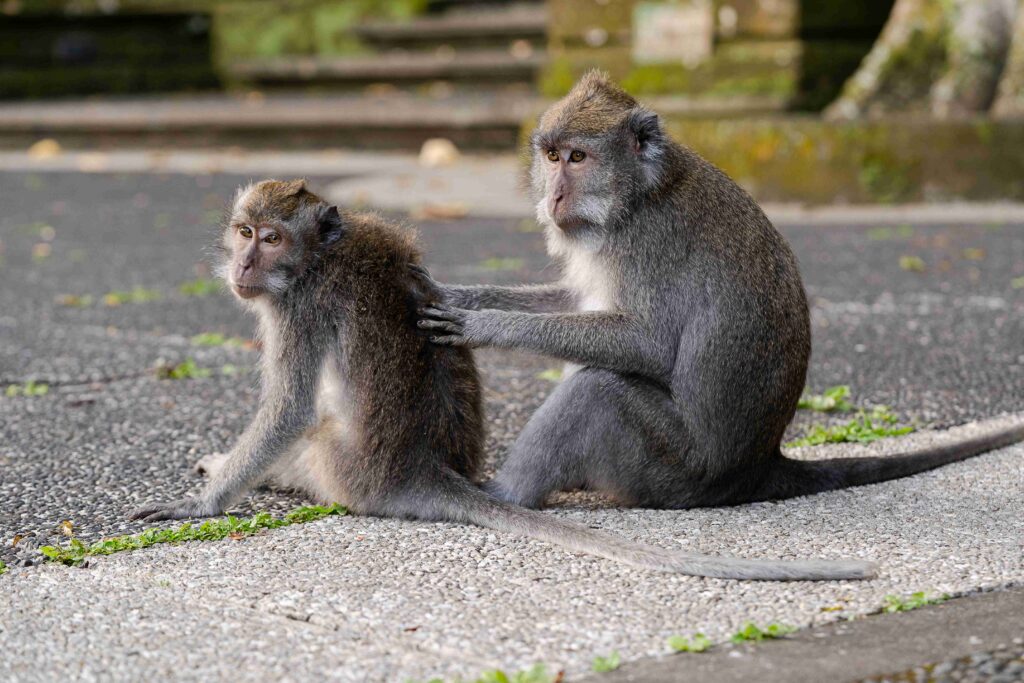
It may not be as famous as the monkey forest in the centre of Ubud but there’s no shortage of monkeys at Sangeh.
It’s also cheaper, less crowded and quieter which is great but the best news is that the monkeys are much nicer here. They are calm and well-behaved primates.
There are four temples to be found here and you will be given a map to find them all when you buy your entrance ticket.
They are all Mengwi Royal Family temples and were constructed in the 17th century. They’re very photogenic. (We’ve got a great guide to Mengwi on the site too). Where Is It? Jl. Brahmana, Sangeh, Kec. Abiansemal, Kabupaten Badung, Bali 80353, Indonesia
Batuan Temple: Batuan Village
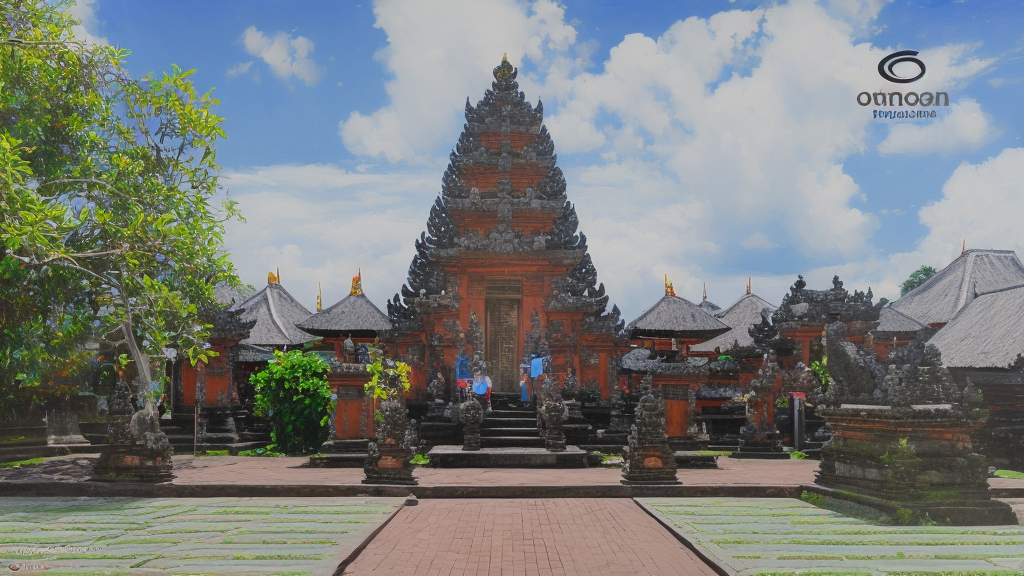
This is a fascinating village temple and it’s very different in its architectural style to most of the other temples in Bali.
It was built during the 10th century and is one of three temples in this village, each of which is dedicated to one of the gods of the Trinity.
The split-gate here is really impressive and the shrine directly behind it makes for an amazing photograph.
There is a local joke that says the people who pray at this temple are as “tough as stone” or “can chew rocks”. This is because “Batuan” means “stone” in Balinese.
Where Is It? C79G+37, Jl. Raya Batuan, Batuan, Kec. Sukawati, Kabupaten Gianyar, Bali 80582, Indonesia
Abiansemal Temple: An Enigma In The Countryside
This temple is on the road out to Sangeh and there’s very little information available about it in English or that we could glean when we visited the site.
However, we can heartily recommend a visit to this place as the green foliage growing on the building gives it a unique vibe.
There won’t be many other tourists around either, no matter what time you arrive.
Where Is It? Jl. Raya Abiansemal No.21, Abiansemal, Kec. Abiansemal, Kabupaten Badung, Bali 80352, Indonesia
Taman Ayun Temple: Photogenic Bliss
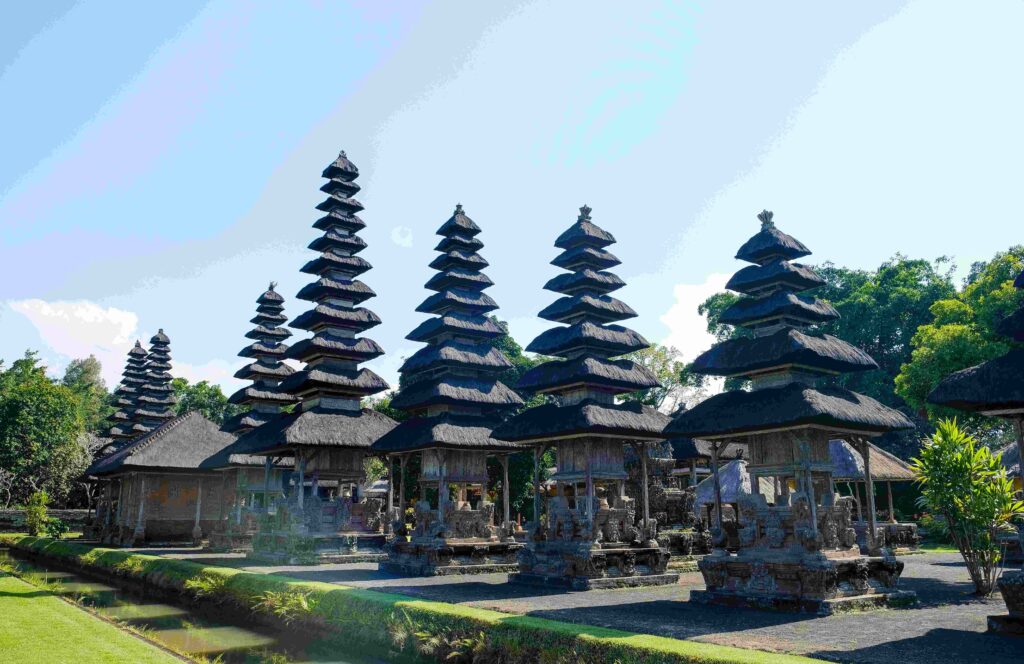
This temple is recognized by UNESCO as one of the most valuable cultural and historic sites in Bali.
However, it’s a bit out of the way compared to some of the other temples in the region and thus, despite being a spectacular location, it’s rarely busy.
Do take a camera as this place is really pretty and you’ll want to get a ton of snaps to share with friends back home.
The whole place feels like it has been transported from India and then popped down gently in the jungles of Bali, it’s magical.
Our guide to Pura Taman Ayun has all you need to know about this amazing temple.
Where Is It? Jl. Ayodya No.10, Mengwi, Kec. Mengwi, Kabupaten Badung, Bali 80351, Indonesia
Pura Dalem Kahyangan Kedaton: Bat & Monkey Sanctuary
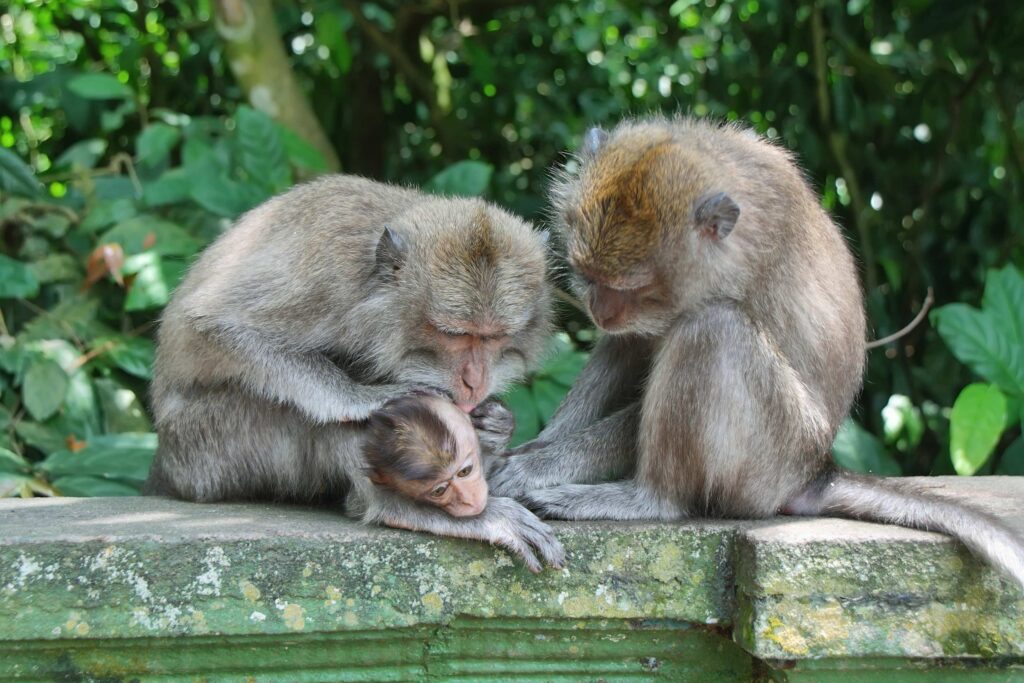
This is in, yet another, monkey forest and it’s a lovely little temple grouping but most people don’t visit for the religious and spiritual aspect, they come because it’s a bat and monkey sanctuary.
If you’ve always wanted an awesome photograph of a fruit bat, this is the place to be in Bali!
Where Is It? 96W7+6FC, Peguyangan Kaja, Kec. Denpasar Utara, Kota Denpasar, Bali 80239, Indonesia
Pura Taman Pecampuhan Sala: Private Purification
If you want beautiful statues, purification pools and purification baths and you don’t want to deal with big crowds, this is a great place to come.
While tourists are welcome here, they don’t seem to know that it exists and thus. you will rarely find any other foreigners enjoying the water.
However, we should warn you that you will need to climb down some long stairs to avail yourself of the healing properties of the water here.
Where Is It? G8XG+5W7, Abuan, Kec. Susut, Kabupaten Bangli, Bali 80661, Indonesia
What Do You Wear To The Temples In Ubud?
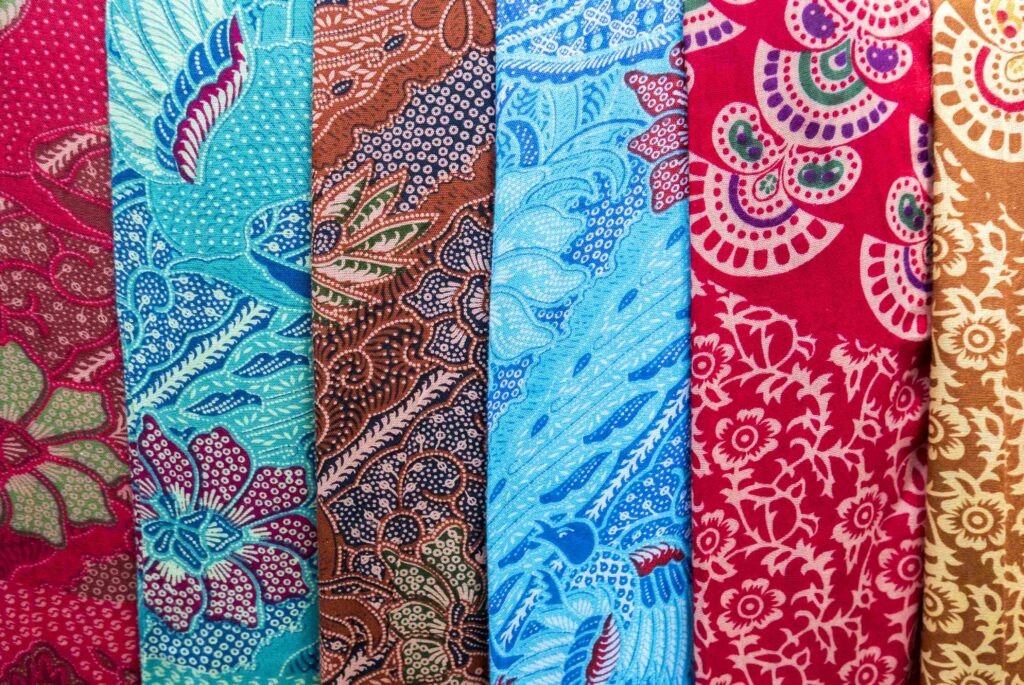
We cannot stress strongly enough that the Ubud temples are living temples. That means they are used by the local people to pray and worship.
They are sacred and holy and it’s expected that you treat them as such when you’re visiting temples. You’re entirely welcome to come in, but you do need to follow the dress code and for a Hindu temple that means – you must cover your shoulders and your legs.
The locals wear a shawl and a sarong for this purpose and you can usually rent and/or buy these garments cheaply enough outside a temple if you don’t have appropriate clothing on you.
If you visit Hindu temples that are a long way off the tourist path, such as Pura Taman Pecampuhan Sala (see above for more details), then it’s a good idea to wear a shawl and a sarong as the locals a these beautiful temples are not going to be used to seeing Westerners march around in their usual tourist wear.
If you try to enter a temple grounds improperly dressed, you will be refused admittance and if you’re caught inside a temple without the correct clothing, you may be asked to leave or even find yourself on the receiving end of an angry lecture.
In theory, you can be deported from Bali or even jailed for dressing disrespectfully in a temple. Recent events on the island have seen several tourists become the focus of international ire for acting badly in a Balinese temple, it’s probably best just to stick to the dress code.
Temple Etiquette In Bali
There is also some very basic temple etiquette to follow in the temples in Bali. This includes:
Please don’t shout or scream and definitely don’t swear or curse. Again, these are holy sites and local people aren’t going to be very amused if you act like this, in the same way as you would be annoyed at someone acting like this in a church or other important place.
Ladies should not enter temples whilst menstruating. This is a long-established religious rule that states in Hinduism, women are considered to be unclean and thus will defile the temple when they are menstruating. We don’t make the rules, but it’s polite to follow them even if you don’t agree with them.
Be a considerate photographer. Nobody minds you taking photos in any of the temples in Bali but please let people pray without interference. Don’t use a flash inside any of the buildings (crank up your ISO – there are plenty of software packages that can denoise your shots now). And most of all, please don’t climb on things or move things around to improve your vantage or composition. Also, be aware that while you can use drones in Bali, it’s generally not OK to use them over a temple without agreement (which costs money) from the temple authorities.
Don’t use a drone. Nearly all temples in Bali now have signs up asking you not to use your drones. It’s the sound of them that drives people crazy.
Don’t point your feet at a shrine. In both Hinduism and Buddhism, feet are considered to be unclean and it’s rude to point your feet at a temple’s shrine (and to point them at other people). Also, it’s disrespectful to raise your feet above people’s heads, so watch those yoga poses, please.
Don’t enter the inner sanctum unless invited by a priest (manku). These areas are off-limits to tourists but occasionally a priest may welcome some visitors to go inside.
No PDAs. Bali may be more tolerant than most of Indonesia when it comes to public displays of affection, but there are limits and those limits are outside the temples.
What To Do When You’re All-Templed Out?
Indonesia and, in fact, most of Southeast Asia is home to a lot of amazing temples and once you’ve seen a few of the most famous temples, you may start to feel that the temples you see are all starting to look the same.
That doesn’t mean that they are the same. It means you’re “all templed out”. It’s what ex-pats call it when temple fatigue sets in and even the most beautiful Ubud temples start to feel boring.
The trick is not to keep pushing on but to take a break from the Ubud temples and, perhaps, a break from Ubud itself and do something completely different for a few days.
For example, we’d recommend that you head down to Canggu and spend some time at FINNS, the best beach club in the world, it’s so different from temple hikes that you’ll quickly feel refreshed.
Then, once you’ve given yourself a bit of a break, you can always go make to explore more of the Ubud temples or, indeed, any of the Balinese temples on the island.
FAQs
What Is The Main Temple In Ubud?
Pura Dalem Agung Padangtegal is the “main temple” of the Ubud Monkey Forest but it’s fair to say that there’s no “main temple” of all the temples in Ubud.
The Besakih Temple is the “Mother Temple” or “Main Temple” of Bali but it’s not in Ubud, it’s on the slopes of Mount Agung in East Bali.
We think the best way to explore the Ubud temples is to visit the ones that most appeal to you from the pictures and write-ups online.
The beautiful temples here are sacred places and given that most people will not have time on holiday to visit them all, it’s fine to choose the ones you think that you will enjoy most but it would be disrespectful for us to start ranking them.
Is The Saraswati Temple Worth Visiting?
Yes! Given that it’s in Central Ubud, if you’re staying in the area for any length of time it’s a great place to go and appreciate the architecture and ornamentation.
It’s not the biggest of the Ubud temples and most people will only spend an hour or so on the grounds.
There is a nice restaurant nearby where you can get a cup of coffee or a cold drink and just relax and enjoy the view of the temples too.
Which Temples Are “Must See” In Bali?
There are so many wonderful temples in Bali (there are more than 20,000 temples in Bali and the island is called “the island of a thousand temples”) that we couldn’t hope to list them all for you here.
Some of the highlights include:
Taman Ayun
Tirta Empul Temple
Taman Saraswati Temple
Besakih Temple
Gunung Kawi
Ling Gwan Kiong Chinese Temple
Petitenget Temple
Gunung Lebah Temple
Batuan Temple
Kehen Temple
Vihara Dharmayana
Penataran Sasih
Samuan Tiga
Blanjong
Final Thoughts On Temples In Ubud
The Ubud Temples are amazing and there are plenty of temples to choose from when you visit this part of Bali.
Of course, there are plenty of other attractions in Ubud including the rice terraces, the art market, the yoga studios, and amazing bars and restaurants but the spiritual nature of Ubud is what draws so many people to the highlands of Bali.
And when you’re all templed-out? We’ll be waiting to welcome you to FINNS in Canggu, the best beach club in the world, so that you can have a bit of a party and get back in touch with the worldly joys of Bali too.

